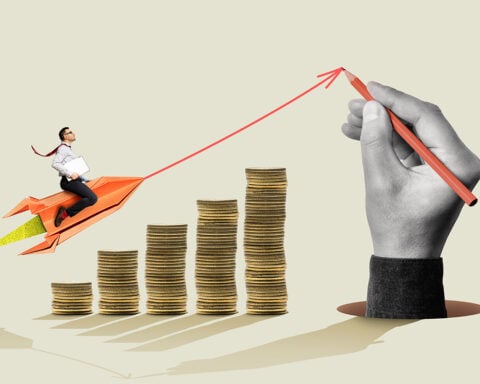For long-term investment opportunities, consider stocks from companies that demonstrate solid financial health, are undervalued, and offer consistent dividends.
Identifying the best long-term investment stocks can be approached in several ways. For instance, investors could take a page from the book of Benjamin Graham, the pioneer of value investing, and use the principles detailed in his seminal work, The Intelligent Investor.
Graham recommends that a prudent investor invests in shares of large, financially conservative companies with solid earnings potential. These companies should also rank amongst the top dividend-paying stocks, with a consistent history of payouts, and should be undervalued.
However, many tech stocks in today’s landscape don’t issue dividends. Instead, these companies often allocate capital to shareholders via sizable stock buybacks.
Thus, applying Graham’s criteria in today’s context implies identifying the best stocks to invest in that return substantial amounts of capital to shareholders through dividends or stock buybacks.
Such a strategy enables a company to enhance its earnings and dividends per share. Concurrently, the remaining shareholder’s stakes appreciate over time. These factors collectively contribute to a rise in the stock’s value.
Another of Graham’s principles involves identifying stocks with low valuation. Over the past decade, the S&P 500 has held a comparatively high price-to-earnings (P/E) ratio of 31.4 times. This piece will emphasize stocks with price-to-earnings ratios lower than the general market.
Lastly, we will focus on stocks with market capitalizations of $100 billion. These stocks must also exhibit low debt ratios and sufficient cash flow to decrease debt while paying dividends and conducting buybacks.
Given these criteria, here are nine of the most promising stocks for long-term investment.
Apple
Market value: $3.08 trillion
Dividend yield: 0.5%
Apple, the $3 trillion company famous for the iPhone, Mac computers, iPads, and numerous other products and services, is a top pick.
iPhones still account for over half of the company’s sales, but its services segment, which includes the App Store, has begun to grow. For instance, Apple’s services revenue amounted to $20.9 billion, or 22% of its $94.8 billion in sales in the quarter ending April 1. That’s an increase from 20% a year ago and 18.9% two years ago.
This tech giant is gradually reducing its heavy reliance on the iPhone, whose models come with a hefty price tag. The market, so far, has been receptive to this strategy.
Given the company’s impressive generation of free cash flow (FCF), which is the money remaining after covering operational costs and business expansion expenses, it makes sense. Last quarter, Apple reported a robust operating cash flow of $28.6 billion, while it returned over $23 billion to shareholders.
Apple pays a modest dividend, recently increased by 4% to 96 cents annually, equating to a 0.5% dividend yield. However, this expenditure cost the company just $3.7 billion, or 13% of its operating flow.
The remaining $23 billion “returned” to shareholders came through stock buybacks. Apple boosted the amount it intends to spend on share repurchases this year to $90 billion, equating to over 3.3% of its market value.
This strategy will be advantageous for long-term Apple stockholders as it will incrementally increase AAPL’s earnings per share by reducing the total number of shares in circulation. Furthermore, the dividend per share can rise faster since the dividend payments will be distributed among a smaller number of outstanding shares. Another effect is the absorption of shares traded in the market, effectively acting as a market buying force, pushing the blue-chip stock higher.
Bear in mind, though, that APPL stock is not particularly cheap, trading at 28.7 times future earnings – above its five-year average of 23.7, as per Morningstar. However, it’s slightly below the S&P 500’s average.
Apple remains one of the best long-term investment stocks due to its regular and robust cash flow, dividends, and buybacks.
Microsoft
Market value: $2.50 trillion
Dividend yield: 0.8%
Microsoft operates across all major software sectors: operating systems, cloud, gaming, application software, and even artificial intelligence (AI) with its Bing chatbot.
MSFT holds all the essential attributes of an excellent long-term investment stock, boasting consistent earnings, conservative financing, and substantial free cash flow generation. Moreover, it pays dividends and primarily uses its FCF for share buybacks.
Like Apple, MSFT stock isn’t particularly cheap in relative or historical terms. Microsoft is trading at 30.4 times future earnings, above its five-year average of 28.6. However, it’s still below the S&P 500’s long-term average.
Long-term investors can anticipate favourable outcomes with MSFT. The reasons are straightforward: the company’s massive cash flow, the ubiquity and acceptance of its products, and its shareholder returns all contribute to the stock’s appeal.
For instance, Microsoft recently posted a 21% YoY increase in fiscal Q4 earnings per share, while revenue was up 8%. Plus, free cash flow increased by 12% from the prior year.
The company has ample space to enhance its shareholder-friendly initiatives over time. It spends about half its free cash flow on dividends and buybacks and reinvests the rest into the company, reducing debt and making investments and acquisitions.
In the long run, Microsoft shareholders can expect the company to consistently grow profits and cash flow while steadily increasing its dividends and buybacks. Microsoft has a record of 18 consecutive years of dividend increases. This factor alone, excluding its buybacks and earnings power, makes the Dow Jones stock an appealing long-term investment.
Chevron
Market value: $303.4 billion
Dividend yield: 3.7%
Chevron, a global integrated energy and chemicals company with upstream and downstream operations, also makes the list.
CVX fits the profile of an ideal long-term investment, having conservative financing, good profits, and an attractive, affordable dividend. In addition, CVX stock is not expensive, and the company is actively repurchasing shares, helping drive its value higher.
Analysts expect Chevron to generate $11.94 per share in fiscal 2023, resulting in the energy stock trading at 13.6 times future earnings. This is significantly below the five-year average of 37.9 times.
Furthermore, Chevron boasts a 36-year streak of annual dividend increases. Despite fluctuations in oil and gas prices and chemical industry cycles, the company consistently produces substantial free cash flow.
In Q2, Chevron generated $9.4 billion in operating cash flow before working capital changes and $2.5 billion in free cash flow. The company allocated $2.8 billion to dividends and $4.4 billion to share buybacks, resulting in a record $7.2 billion in total shareholder returns.
This demonstrates Chevron’s balanced approach to investing in future growth while rewarding its current shareholders with cash flow. This balance explains why CVX has been a desirable stock for long
It has reliable earnings, good dividends and a low valuation, making it a solid choice for value investors.
These are only some of the best long-term investment stocks to buy now, but these four companies represent a wide array of industries, providing some balance and diversification.
This may not be a complete list, but they certainly are worthwhile companies to consider for those looking for value, income and growth over the long term.
Medtronic
Market value: $116.7 billion
Dividend yield: 3.2%
Medtronic, a medical device and therapies pioneer recognized for inventing the pacemaker, represents a strong option for those seeking reliable retirement stocks. Its robust profitability fuels a generous dividend and considerable share buybacks.
Currently, MDT stock presents a 3.2% dividend yield projected to grow, given its consistent track record of increasing dividends for 46 consecutive years, including a recent 1.5% boost in May.
In fiscal 2023 (ended April 28), Medtronic repurchased $645 million of its stock, roughly 0.55% of its $117 billion market capitalization. Though modest, this share repurchase supports continuous dividend growth.
Trading at 17.1 times future earnings, the stock is attractively valued, significantly below MDT’s five-year average of 19.1 times, as per Morningstar.
Medtronic carries around $17 billion in net debt on its books, substantially lower than its $52 billion shareholders’ equity. Its cash flow, recovering from previous supply chain issues, should enable a gradual reduction of debt over time.
MDT remains one of the best long-term investment options considering its potent cash flow and shareholder returns.
Charles Schwab
Market value: $119.6 billion
Dividend yield: 1.5%
Charles Schwab, a reputable discount brokerage and investment banking firm, fulfills all criteria for a long-term value investment. It boasts conservative financing, a consistent 1.5% dividend yield, and a reasonable valuation.
Schwab has reliably paid dividends for 34 consecutive years, surpassing the sector median’s 10-year average. Its return on equity hit 20% in the six months ending June 30, up from 15% in the previous year, signifying a significant earnings recovery.
At 17.2 times future earnings, SCHW trades well below its five-year average of 18.6. The company temporarily suspended its share buyback program due to financial sector uncertainties following a spring banking crisis. However, this could reverse once the Federal Reserve stops hiking interest rates, potentially triggering a significant upswing.
McDonald’s
Market value: $212.5 billion
Dividend yield: 2.1%
The globally recognized brand, McDonald’s, is more than just a familiar fast-food chain; it’s also an attractive long-term investment prospect.
McDonald’s generates substantial free cash flow. For instance, in the last 12 months ending March 31, MCD yielded $5.7 billion in FCF, amounting to 2.7% of its $212 billion market cap. The company uses this cash flow to pay an attractive 2.1% dividend and repurchased nearly $3 billion of its shares last year.
Although not everyone enjoys McDonald’s fast-food offerings, many consumers enjoy their menu items, contributing to a consistent cash flow. The company’s $37 billion long-term debt (reduced to $33.3 billion after cash) is well-controlled thanks to its ongoing FCF generation.
MCD’s shareholders benefit from its 46-year streak of annual dividend increases, making it a favourable long-term investment. Alongside its buybacks, MCD stock is reasonably valued, trading at 26.8 times earnings, below its five-year average.
To sum it up, McDonald’s is a loved choice for fast food and long-term investment.
Procter & Gamble
Market value: $368.3 billion
Dividend yield: 2.4%
Procter & Gamble, a nearly $370 billion multinational consumer goods company, boasts a plethora of renowned brands, such as Downy, Mr. Clean, and Head & Shoulders. These brands fuel significant cash flow for the corporation.
While Procter & Gamble’s brands are familiar to most people due to their strong reputations, few recognize its impressive profitability, positioning PG as a beautiful long-term investment.
Over the last 12 months, ending on June 30, PG generated an operating cash flow of $15.2 billion. After $3.0 billion in capital expenditures, the free cash flow stood at $12.2 billion.
This FCF amounts to an impressive 15% of P&G’s $81 billion LTM sales, an exceptional FCF margin for a consumer products company. Such margins are usually associated with software companies.
The abundant FCF also supports considerable dividends and buybacks for shareholders. The company has raised its dividend annually for the last 66 years. Moreover, during its recent earnings call, Procter & Gamble management projected a buyback of $5 billion to $6 billion in common stock this fiscal year, approximately 1.5% of its market capitalization.
Despite this, PG’s valuation remains reasonable compared to its historical figures, trading at 26.5 times earnings, significantly below its five-year average of 35.0.
Procter & Gamble, with its competitive pricing, significant cash flow from its brands, and committed return to shareholders, is one of the best long-term investment options for value buyers.
3M
Market value: $61.0 billion
Dividend yield: 5.4%
3M, a $61 billion industrial conglomerate, spans four sectors: safety and industrial; transportation and electronics; healthcare; and consumer. It’s driven by a mission to apply science to improve daily lives.
Nevertheless, MMM is also a compelling choice for long-term investors. For instance, 3M generated $1.5 billion in free cash flow in the second quarter, returning $800 million to shareholders through dividends.
In addition, 3M regularly repurchases its common stock, buying back $1.4 billion of its shares in 2022.
With its robust free cash flow, investors can be confident in the security of MMM’s $6.00 annual dividend, yielding a notable 5.4%.
Moreover, 3M stock is a bargain, trading at just 11.6 times forward earnings, well below its five-year average of 16.6.
Also, 3M is prudently financed. The company reported a net debt of $11.7 billion at the end of Q2, a 12% YoY reduction.
Considering its robust cash flow, dividends, buybacks, low valuation, and financial strategy, the industrial stock is a sound long-term investment for value buyers.
Coca-Cola
Market value: $267.1 billion
Dividend yield: 3.0%
Coca-Cola, a renowned beverage company, produces significant cash flow for its shareholders, leveraging its famous brands such as Coke, Diet Coke, Fanta, Powerade, and Minute Maid.
This fact makes it an excellent long-term investment option for value buyers – Warren Buffett’s Berkshire Hathaway (BRK.B), the top shareholder, can attest to that. KO’s allure lies in being one of Wall Street’s best dividend stocks, consistently increasing its payouts for the last 60 years. Most recently, Coca-Cola boosted its dividend by nearly 5% in February.
Currently, KO stock offers a compelling 3% yield, with prospects of a continued dividend increase.
Furthermore, Coca-Cola has a solid joint stock buyback program. In the last 12 months ended June 30, it expended $872 million on share repurchases, equivalent to 0.33% of its $267 billion market value.
KO’s dividends and share buybacks are easily covered by the anticipated $9.5 billion in FCF to be generated in 2023.
Additionally, the consumer staples stock is trading at 25.6 times earnings, considerably below its five-year average of 32.1.
Therefore, given its strong cash flows and shareholder-friendly policies, KO stock emerges as a worthwhile investment for the long-term investor.
Investing in the long term requires strategic planning and an eye for companies that not only show robust financial health and steady earnings but also provide consistent dividends and have strong potential for growth. The stocks listed above tick these boxes and stand out as worthy of consideration for a diversified, long-term investment portfolio. However, always remember to conduct thorough research before making any investment decisions.







